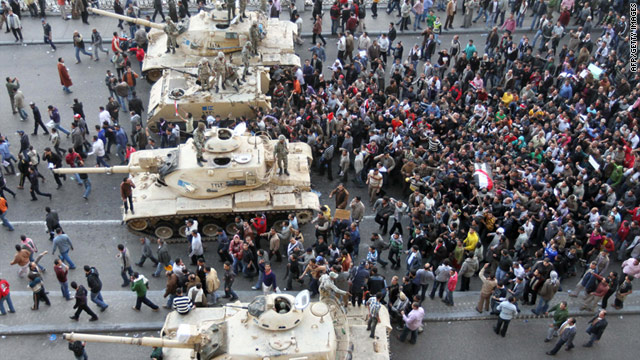
Egyptian demonstrators demanding the resignation of President Mubarak carry the body of a dead protestor past army tanks
(CNN) -- With unprecedented numbers of protesters on the streets of Egypt calling for President Hosni Mubarak to resign, what clues do earlier demonstrations in the region offer about what will happen in Cairo?
Results have been mixed.
Tunisia, a relatively small and apparently stable country on the Mediterranean, triggered the current wave of anti-government protests across the Middle East.
It had been ruled by President Zine El Abedine Ben Ali for 23 years and was seen as a well-established police state.
But in December 2010, a fruit seller named Mohamed Bouazizi, 26, set himself on fire in protest after police took away his fruit cart. The profoundly symbolic act of protest awakened a suppressed fury in the population.
President Ben Ali visited Bouazizi's hospital bedside -- the college graduate lived for three weeks before dying January 4 -- but he was unable to assuage the nation's rage at decades of corruption, low living standards and grinding repression.
After weeks of protests in which more than 100 people died, according to the United Nations, Ben Ali fled the country on January 14.
Longtime Prime Minister Mohamed Ghannouchi took the reins of power and created a national unity government, including both members of the old guard and opposition.
But the people demanded fuller reform, and Ghannouchi has continued to shuffle the government to try to appease an angry populace.
New presidential elections have been promised within 60 days of Ben Ali's flight.
That's a dramatically different outcome from what happened in Iran a year and a half earlier, when huge protests erupted after presidential elections in June 2009.
Many Iranians expected the defeat of incumbent hardline President Mahmoud Ahamdinejad, but official results showed him as the winner.
Incredulous at the outcome and determined to overturn it, Iranians took to the streets, declaring that a "Sea of Green" -- the color of Islam -- would force Ahmadinejad out of power.
The apparent revolution captured the imagination of the world, especially after a young woman, Neda Agha-Soltan, was killed by a bullet to the chest during a demonstration.
The last moments of her life were caught on a shaky video that was seen by millions after it was posted online.
But Iranian security forces cracked down hard. The government-backed plainclothes militia known as the Basij waded into demonstrations with motorcycles and clubs, and untold numbers of protesters were rounded up and thrown into prison.
Over time, demonstrations petered out, and the regime stayed in power. A year after the disputed election, Ahmadinejad made a triumphant speech defending it as "free," and accusing "unjust" foreign governments of interfering in Iran's affairs.
"But the Iranian nation defeated them," he declared.
A shocking act of violence led to a peaceful revolution in Lebanon in 2005.
Popular former Prime Minister Rafik Hariri was killed by a massive bombing as he drove through Beirut.
The bomb contained hundreds of pounds of explosives. It killed 22 other people besides Hariri, and left buildings shattered and streets littered with the mangled wreckage of vehicles. .
Many Lebanese -- as well as the United States and United Nations investigators -- thought Syria was responsible.
At the time of Hariri's death, neighboring Syria had immense political influence in the country, and had maintained troops in its smaller neighbor since the 1980s.
The killing sparked widespread protests known as the Cedar Revolution, which led to the eventual withdrawal of Syrian troops from Lebanon and the election of an anti-Syrian bloc in parliament.
Hariri's son Saad became prime minister.
But even in Lebanon, which has much more experience of democracy than most other countries in the region, the results of the revolution remain unclear.
Saad Hariri was forced from power this year after government ministers allied with the Syrian- and Iranian-backed militant movement Hezbollah quit the government.
Najib Mikati, a new prime minister loyal to Hezbollah, took office last week -- on the very day that Hariri supporters took to the streets for a "Day of Rage."
That was Tuesday, the very same day that Egyptians ramped up their own ongoing protests against Mubarak.
In both countries -- and across the Middle East -- the region, and the world, watch and wait to see what happens next.
Source: CNN












0 comments:
Post a Comment